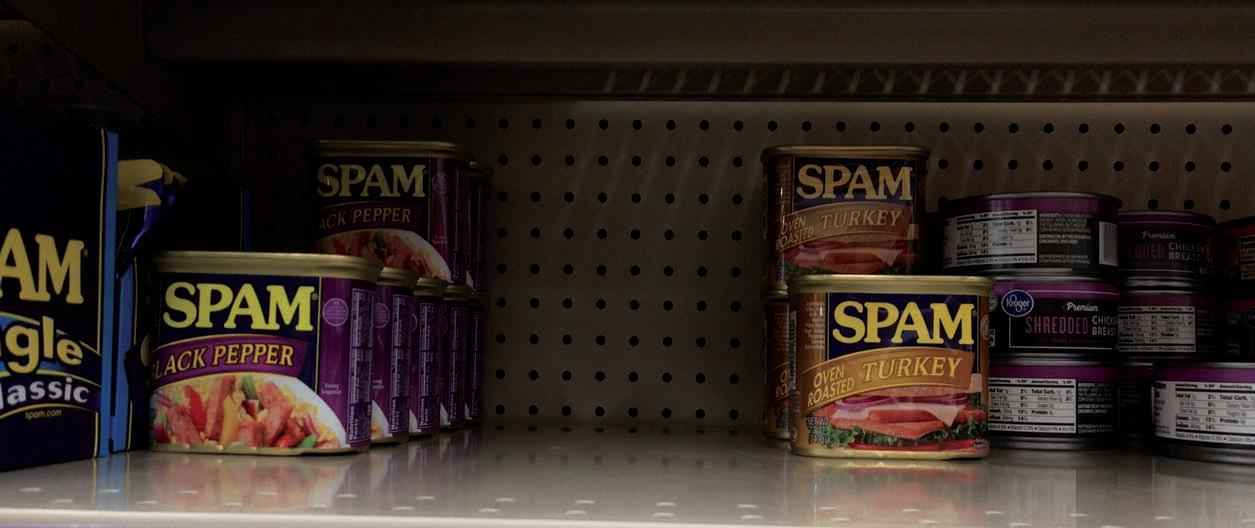
7 minute read
Remembering Herb Tamura

This Spring the HFIA Ohana said goodbye to Herb Tamura, a founding member of our association and an inspirational leader who has shaped the food industry in Hawaii. Herb began his career in the food retail industry as a kid working at his parents’ store in Waianae, Tamura Shoten. Throughout his life Herb worked tirelessly to grow the family business and was dedicated to leading from the front. He espoused values that have become even more meaningful in times like these, dedication to family, grit, hard work, valuing his employees, and giving back to the community. As a founding member of HFIA, Herb was integral in creating an association where industry leaders could learn from each other, communicate, and collaborate for mutual benefi t. Herb and Glenn have built Tamura Enterprises into a local institution, each location an integral part of the fabric of their community. Yet, Herb’s infl uence goes far beyond his own businesses. HFIA and the work we do is a part of his legacy, as are the spirit of hard work, innovation, cooperation, and humility. We will be forever grateful for this guidance and contributions, and we will strive to live up to his example of what a leader in the food industry should be.
Advertisement

NGA UPDATE

BY THE NATIONAL GROCERS ASSOCIATION
Before the onset of the coronavirus (COVID-19) outbreak, a trip to the grocery store was something most of us took for granted. Now, everything has changed. In the midst of a global pandemic, grocery store operators, their employees and our shoppers are all in this together, using every tool in our toolbox to keep the food supply chain humming.
During this public health crisis, the grocery industry has stepped up to the challenge, overcoming obstacle after obstacle to fulfill its mission of keeping store shelves stocked with the life-sustaining food, beverages, personal care and household products needed by 329 million Americans.
There is no manual for this, so independent grocers have had to rely on their expertise and instincts to come up with new strategies to keep the supply chain running as smoothly as possible and to protect employee and customer health and safety.
During this time, NGA is working with lawmakers on Capitol Hill and in the White House to gain support, relief or assistance that makes it easier for our members to fulfill our mission under difficult circumstances. Below is an update and outlook on critical policy issues to the supermarket industry during this time.
Federal Government COVID-19 Response As the public health crisis continues to unfold, Congress has passed three major pieces of legislation to provide assistance to families and the U.S. economy. On March 27, the President signed into law the Coronavirus Aid, Relief and Economic Security (CARES) Act. Building off of the previously passed $8.3 billion emergency public health funding and the Families First Coronavirus Response Act, the CARES Act was a product of bipartisan negotiations between Republican and Democrat leadership and was intended to be a third round of federal government support. The $2.3 trillion stimulus package provides funds to individuals, businesses, and states, among others, in response to the coronavirus pandemic. Alongside other measures, the bill includes $500 billion for loans and assistance to companies and state and local governments, $349 billion in low-interest small business loans, direct cash payments of as much as $1,200 for individual taxpayers and $500 per child, and an additional $600 per week for those receiving unemployment benefits.
Following reports that Paycheck Protection Program (PPP), a new loan initiative included in CARES to help small businesses, had run out of money in mid-April, Congress passed the Paycheck Protection Program and Health Care Enhancement Act. More commonly known as “Phase 3.5,” the $484 billion package provides $321 billion additional funding for PPP – with $60 billion set aside for loans originating from smaller lenders, an additional $60 billion for disaster and other emergency loan programs, $75 billion for hospitals and other healthcare providers, and $25 billion to fund additional COVID-19 testing.
House Democrats and the White House now say they want to launch negotiations on a fifth bill that could top more than a trillion dollars, providing states with assistance to plug revenue shortfalls, major infrastructure investments and possibly a second round of direct stimulus payments. Majority Leader Mitch McConnell (R-KY) has vowed that nothing will move through the upper chamber before May 4, when Congress is set to return. He has also raised concerns about the mounting federal debt.
At the time of this writing, the Senate planned to return to session the week of May 4, but the House announced it would delay its return. With negotiations still ongoing for this additional relief package, various policy priorities remain on the table for what lawmakers are calling “CARES 2”. From drug pricing and pharmacy reforms, to allowing public sector employers to be eligible for the tax breaks for offering emergency paid leave, questions remain over the size and scope of this next bill. Speaker Pelosi (D-CA) has floated a ‘guaranteed income’ policy for certain individuals who make below a certain threshold. Meanwhile, Majority Leader McConnell (R-KY) is focused on shielding healthcare and other businesses from liability regarding COVID-19. The White House has also weighed in on the forthcoming package, with recent statements in support of a second round of direct payments to individuals.
Supplemental Nutrition Assistance Program (SNAP) Recipients of SNAP will receive a temporary 40% increase in monthly benefi ts to provide relief from the pandemic-related economic slowdown. The boost lets families obtaining less than their maximum benefi t get the greatest amount per their household size for as long as two months. The extra SNAP money comes as the spread of COVID-19 continues to push the unemployment rate to levels not seen since the Great Depression. School shutdowns are also forcing parents to provide meals for their children that would otherwise have been provided by their school. “USDA is providing a 40% increase in SNAP benefi ts to ensure that low-income individuals have enough food to feed themselves and their families during this national emergency,” Agriculture Secretary Sonny Perdue said in a statement. Supporting Frontline Workers Supermarket employees are working hard every day to ensure Americans have access to food during this unprecedented emergency. Introduced in April by Congressman Bill Huizenga (MI-02), the Helping Emergency Responders Overcome Emergency Situations (HEROES) Act will provide frontline workers with well-deserved tax relief for their commitment to serving their communities during this pandemic. This proposal provides income tax relief for those working in a duty station that is part of DHS-designated critical infrastructure up to the fi rst $8,900 per month of pay, as well as payroll tax relief for these individuals up to the fi rst $50,000 of their income to ensure a tax benefi t for workers who do not currently owe income tax. Working each day during this emergency presents extraordinary challenges and independent grocery workers are rising to the occasion. For more information on these issues and how you can make your voice heard in Washington, DC, visit www.grocerstakeaction.org.
MEMBER UPDATE
Hawaii energy o ering discounts on lighting and appliances to help you prepare for the COVID-19 recovery period


We’re all in the business of being smart with our money, and with energy being so expensive in Hawaiʻi, we can all benefi t from smarter energy use management. In the midst of this public health and economic crisis, many businesses are using the downtime to make improvements to their lighting, refrigerators and kitchen equipment.
Hawai’i Energy, a valued member of HFIA since December 2019, is now off ering signifi cant discounts on lighting and up to $4,800 per appliance for kitchen equipment to prepare small businesses and restaurants for the recovery period. For more information on the increased incentives, visit https://hawaiienergy.com/ for-businesses.
Hawai‘i Energy helps island families and businesses make smart energy choices and rewards energy decisions that will allow our state to reach 100% clean energy faster and cheaper.
Quick Tips to Maximize Your $$
Grocers are especially experiencing greater demand and managing operating costs has become even more critical. Here are some quick tips to maximize your dollars: • Ensuring refrigerators and freezers are closed and sealed properly • Turning off or unplugging hot bar appliances that are not currently in use • Setting thermostats one or two degrees higher than normal and dimming or turning off lights outside of operating hours • When you’re ready to upgrade to equipment that will reward you with longer-term energy savings, better productivity, and even improved safety Hawai’i Energy will be ready to assist you. If your business has lighting, HVAC or ENERGY STAR appliances, or other energy effi ciency upgrades scheduled or in progress, this work is considered essential and contractors are permitted to continue under the City & County of Honoluluʻs stay-athome order. The Hawai‘i Energy team has taken steps to help prevent the spread of COVID-19 in our community by working remotely and scaling back on programs where person-to-person interaction is necessary.










